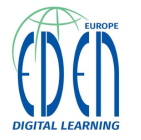February has seen an extraordinary month of activity in pursuit of the EDEN book! By this I mean the volume of ‘best of EDEN conferences’ that the publisher HERMES/iSTE has asked EDEN to prepare, and which we very willingly have set about to achieve.
The story started with a combination of the wish of the EDEN Executive Committee to be able to offer to the world an enhanced opportunity to benefit from the major intellectual capital that exists in the conference papers over the more than 15 years of EDEN’s existence, with the publisher’s understanding that this would be attractive to the market. Martine Vidal, Vice President negotiated with Hermes (iSTE), a Paris and London based publisher, that we would prepare from over the last 9 years a volume based on the best conference papers which would give an account both historically and thematically of developments in distance and e-learning, primarily in Europe. Martine was joined in this endeavour by Uli Bernath, also Vice President of EDEN, and by our indefatigable Secretary-General Andras Szücs.
The first thing to say is that we have been enormously heartened by the enthusiasm of the authors from the EDEN community conferences who have come back with a willingness to revisit, update and revise their conference papers to develop them into papers for the book. This has demanded a great deal of work from them over a short period of time.
The papers in the volume demonstrate a number of things: firstly the ways in which EDEN has succeeded through its conferences to map innovation and analysis across all of Europe over the recent period. The geographical and cultural reach of EDEN is fully representative. Questions are also created from this volume for further research, amongst which is the issue as to the specificities of distance and e-learning in Europe itself. There are a range of educational traditions in Europe – Napoleonic, Humboldtian, the Nordic history, the Anglo-Saxon models, and more – to what extent does distance and e-learning represent these or can it be seen to be offering a newer synthesis out of its own history(ies)? Also gratifying to note is the number of papers that come from outside Europe, showing that European researchers and practitioners are engaging the interests of the global community, but that EDEN as a network is doing the same.
After a planning meeting at On-Line Educa in Berlin before Christmas, the race has been on over the possibility of having the book published and available at the main EDEN 2009 conference in Gdansk in June. At the minute we have the texts ready, which represents a Herculean effort by Martine, Uli and Andras, and we are trying to manage the copyright issues which are the remaining barrier to achieving the deadline. Fingers are crossed on this, as we say in English (do people cross their fingers for luck all over Europe? I think so!).
Oh, and the daffodils are out in Cambridge!






